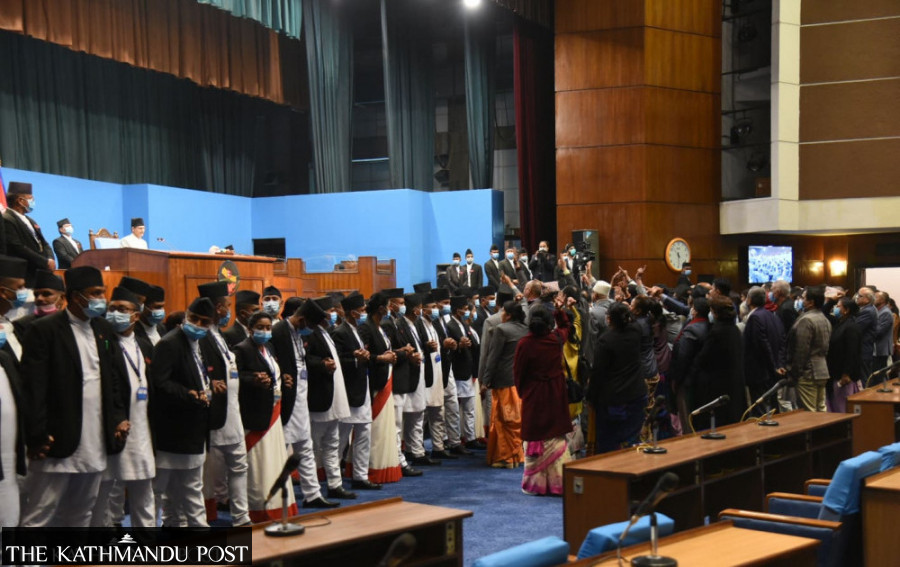National
How the House restored twice became totally dysfunctional
Politicians, both from ruling and opposition parties, have trampled on the sovereignty of the hallowed parliament, observers say.
Binod Ghimire
A meeting of the House of Representatives has been slated for Monday following several deferrals, but yet another postponement is highly likely if parties—both ruling and opposition—fail to find an ever-elusive consensus on a highly charged-up issue called the Millennium Challenge Corporation-Nepal Compact.
The last two House meetings were particularly deferred due to differences over the $500 million American grant, failing ratification of which by the February 28 deadline Nepal could face a serious setback—strategically, diplomatically and economically.
Washington has made its position—a tough one—clear that it wants to see the Millennium Challenge Corporation (MCC)-Nepal Compact put to vote for ratification rather than just tabling.
Prime Minister and Nepali Congress President Sher Bahadur Deuba has regularly been holding meetings with Communist Party of Nepal (Maoist Centre) chair Pushpa Kamal Dahal and CPN (Unified Socialist) chair Madhav Nepal on the MCC issue. However, his efforts have failed to yield positive results. Saturday’s meeting between the three leaders also failed to find any meeting point on tabling the MCC compact as Dahal and Nepal reiterated their positions that amendments to some of its provisions are a must before tabling.
Instead, Dahal, according to sources, proposed postponing the House meeting at least for a couple of days again. As per the Maoist Centre leaders in Dahal’s secretariat, he has proposed deferral of the meeting until Wednesday. The main opposition CPN-UML also has urged Speaker Agni Sapkota to postpone the meeting citing its provincial meetings on the day.
It will be the seventh time the House meeting will be postponed since January 2 if it does not convene on Monday. Not a single meeting has been held for the last 40 days. While the previous meetings were postponed citing increasing cases of the coronavirus, the last two meetings got deferred mainly because of the differences over tabling the MCC compact.
The main opposition UML has anyway been obstructing the House over its anger at Speaker Sapkota.
“The UML has requested for the deferral and I have also heard the issue was raised at the meeting of three top leaders [Deuba, Dahal and Nepal],” Gopal Nath Yogi, secretary at the House of Representatives, told the Post. “However, no decision has been taken yet.”
An official at the Parliament Secretariat said it is highly possible that the meeting will get postponed if both the ruling and opposition parties want it.
Nepal’s ruling and opposition parties have a history of making the House dysfunctional over their partisan interests.
Observers say Nepali politicians have failed to develop the culture of respecting the Parliament which actually they should be treating as a shrine. Parliament is the heart of democracy, but Nepali parties miss not even a single opportunity to undermine it and trample upon it, according to them.
The UML has been obstructing the House meetings since its previous session that started on September 8, in protest against Sapkota’s refusal to take action against 14 of its lawmakers who later formed the CPN (Unified Socialist). The UML on August 14 recommended that Sapkota sack them as lawmakers. However, Sapkota waited until they formed a new party. He then issued a statement on August 29 saying it was not necessary to take action against them as they had already formed a new party.
Observers say it’s extremely undemocratic on the part of parties not to let the House function, which was restored twice after the erstwhile government led by Oli dissolved it in December 2020 and May 2021.
Those who approached the court both times to demand restoration of the House currently make up the ruling coalition.
While it was because of the fight between the UML and Sapkota that was the cause of no meetings, lately ruling parties have been asking for not convening the meetings.
“House obstruction is an irresponsible act by the UML,” Daman Nath Dhungana, a former Speaker and civil society member, told the Post. “By not allowing the House to function, it is obstructing the voice of the sovereign people from being raised through their representatives.”
Generally, the opposition parties obstruct the House proceedings to oppose the move of the government, according to experts on parliamentary affairs. The UML’s obstruction, however, is targeted at the Speaker.
The main opposition party has been saying it will lift the obstruction only if the 14 lawmakers are stripped of their responsibilities as lawmakers or the Speaker resigns from his position.
“We had to obstruct the House to oppose injustice by the Speaker,” Bishal Bhattarai, chief whip of the UML, told the Post. “The obstruction will not be lifted unless our concerns are addressed.”
The ongoing winter session is mainly focused on discussing and endorsing bills. Around 50 bills are pending in the federal parliament, some of them from the first session that commenced in 2017. In addition to the MCC compact, crucial bills concerning such as amendment to the Citizenship Act, Federal Civil Service, Federal Education and Public Service Commission are awaiting approval.
Experts on parliamentary affairs say both the opposition and ruling parties are turning the House useless. They say postponing the House meetings by issuing a notice without giving valid reasons is tantamount to trampling upon the parliamentary sovereignty.
“It is absolutely wrong to postpone the meetings multiple times keeping the lawmakers and the people in the dark,” Som Bahadur Thapa, a former secretary at the Parliament Secretariat, told the Post. “Parties should revere and respect the sovereign parliament but they are turning it dysfunctional to serve their interests.”




 20.53°C Kathmandu
20.53°C Kathmandu















